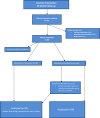The rise of assertive community interventions in South Africa: a randomized control trial assessing the impact of a modified assertive intervention on readmission rates; a three year follow-up
- PMID: 24571621
- PMCID: PMC3974055
- DOI: 10.1186/1471-244X-14-56
The rise of assertive community interventions in South Africa: a randomized control trial assessing the impact of a modified assertive intervention on readmission rates; a three year follow-up
Abstract
Background: Many countries have over the last few years incorporated mental health assertive interventions in an attempt to address the repercussions of deinstitutionalization. Recent publications have failed to duplicate the positive outcomes reported initially which has cast doubt on the future of these interventions. We previously reported on 29 patients from a developing country who completed 12 months in an assertive intervention which was a modified version of the international assertive community treatment model. We demonstrated reduction in readmission rates as well as improvements in social functioning compared to patients from the control group. The obvious question was, however, if these outcomes could be sustained for longer periods of time. This study aims to determine if modified assertive interventions in an under-resourced setting can successfully maintain reductions in hospitalizations.
Methods: Patients suffering from schizophrenia who met a modified version of Weidens' high frequency criteria were randomized into two groups. One group received a modified assertive intervention based on the international assertive community treatment model. The other group received standard care according to the model of service delivery in this region. Data was collected after 36 months, comparing readmissions and days spent in hospital.
Results: The results demonstrated significant differences between the groups. Patients in the intervention group had significantly less readmissions (p = 0.007) and spent less days in hospital compared to the patients in the control group (p = 0.013).
Conclusion: Modified assertive interventions may be successful in reducing readmissions and days spent in hospital in developing countries where standard care services are less comprehensive. These interventions can be tailored in such a way to meet service needs and still remain affordable and feasible within the context of an under-resourced setting.
Figures
References
-
- Marshall M, Lockwood A. Assertive community treatment for people with severe mental disorders. Cochrane Database Syst Rev. 2000. p. CD001089. - PubMed
-
- Petersen L, Jeppesen P, Thorup A, Abel MB, Øhlenschlaeger J, Christensen TØ, Krarup G, Jørgensen P, Nordentoft M. A randomised multicentre trial of integrated versus standard treatment for patients with a first episode of psychotic illness. BMJ. 2005;331(7517):602. doi: 10.1136/bmj.38565.415000.E01. - DOI - PMC - PubMed
Publication types
MeSH terms
LinkOut - more resources
Full Text Sources
Other Literature Sources
Medical
Miscellaneous



